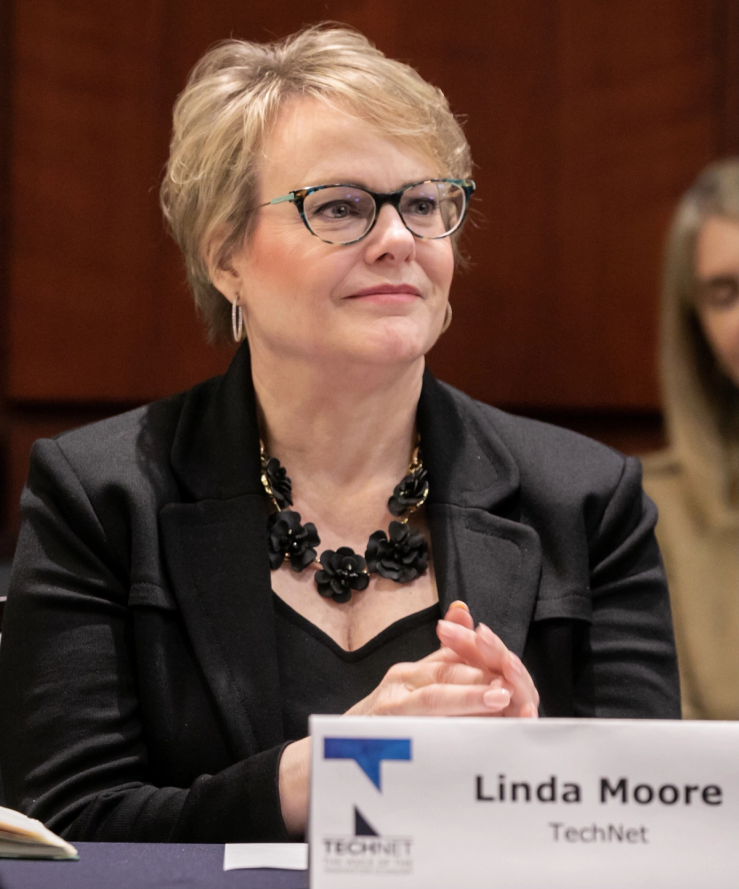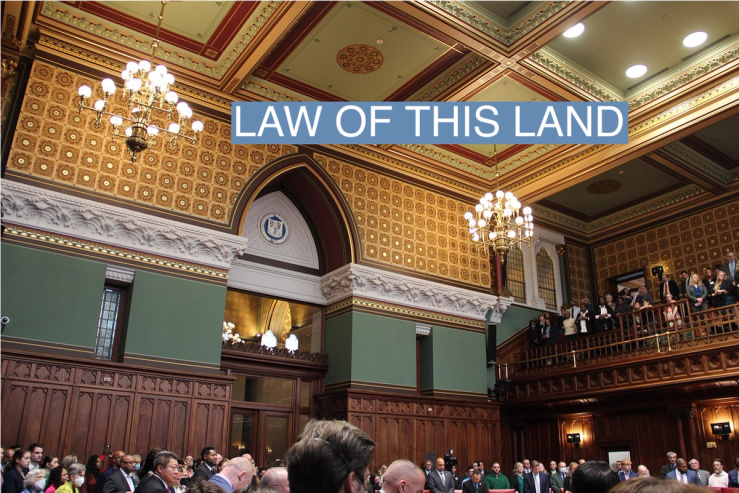The Scene
While Congress is talking a lot about artificial intelligence but doing little to regulate it, state legislatures are moving quickly ahead, presenting a possible future where companies and users have to contend with 50 different AI rules.
One of the industry groups at the forefront of lobbying states, along with Washington, is TechNet, whose members include a mix of startups, venture capitalists, and big tech companies like OpenAI, Sequoia, and Apple.
TechNet CEO Linda Moore, who was in Silicon Valley last week, noted the dialogue in DC is focused on averting risk and looking back at the past for missed opportunities or mistakes to apply to its approach on AI. Meanwhile, the tech sector on the West Coast is thinking about the future.
In this edited conversation, we talked to her about the more than 400 AI bills proposed across the 50 states and whether the industry thinks any of them make sense.
The View From Linda Moore

Q: You’ve now been on the job for 10 years. Is your job more or less difficult today?
A: More difficult. DC moves rather slowly, but even that is a lot to handle right now. At the state level, we have not only the best 50-state program in the tech industry, it’s the only one in the tech industry.
And things at the state level happen so quickly, not just in California, but all around the country. That’s a lot to keep up with. So there’s a lot going on right now on all of the AI bills that are moving in California. But a lot of the focus this week is on Connecticut and Colorado, for example.
Q: As far as the AI bills go, the tech industry seems to see the Connecticut bill as a relatively good one. Do you agree?
A: It has a lot of merit to it. I can’t say there aren’t things in it that couldn’t be improved. But [State Senator James Maroney] is a person who our team has worked with a lot over the past two years. He’s very well versed on the issues and knows a lot about privacy. And now he’s really delved into AI. So he’s a very thoughtful and effective policymaker. He is also having a huge impact on what is happening in Colorado.
We’ll have to see what happens, though, because there have been some major concerns raised both in Connecticut and Colorado. Governors are wary of establishing the most far reaching AI policy in the country and being the first to do that in their states. They’re also hearing from startups that are very wary of remaining in a place that is going to put such burdens on them.
Q: What are the pain points?
A: There are a lot of reporting requirements and scrutiny requirements that a large company that’s very well established could probably handle because they have a lot of infrastructure for that sort of thing. But for a small company, it would drive them out of business. So you’re just going to move to another place.
Q: Let’s talk about California. Have you met with [State Senator] Scott Wiener?
A: I have in the past. I haven’t recently. But my team has.
Q: Do you think his AI bill could spark a backlash and squander the excitement about Silicon Valley post pandemic?
A: It’s not a new phenomenon that Sacramento is rushing in to regulate tech, because they’ve also done it for the social media companies, they’ve done it on privacy, they’ve done it on the gig economy, they’ve done it on the sharing economy. A lot of the tech companies love to be here for a lot of reasons. The regulatory environment is not one of them.
And at the same time, it’s very important for policymakers to realize, and for the general public to realize, that the progressive government that California is able to put forward, a lot of it is very costly. And the success of the tech companies, the fact that they’re here, and that they are profitable, it makes a lot of that progressive government possible.
Q: You mean in the form of tax revenue?
A: Yes. I very much appreciate the position they’re in. They are there to legislate. And they feel a great sense of responsibility. I feel like their heart is in the right place. They’re trying to do the right thing, I’m sure. But it’s that fine balance of creating a good climate for businesses to grow and for businesses to want to locate here, and also being a regulatory scheme in which companies definitely want to flee. And then we had an exodus of some fairly large companies to Texas, and other places. AI is just the latest frontier.
Q: You mentioned privacy and social media. Those regulatory efforts happened after the industry was pretty established. The generative AI boom is so nascent. Is the speed at which the regulators are reacting new?
A: It’s not surprising, and it’s not unique. It’s happening in other states around the country and it’s happening at the federal level. They are looking back and thinking we should have done XYZ on social media. But also, they’re highly motivated because they realize the tremendous impact that AI is already having and is going to have. It’s natural for legislators to, especially in an election year, to want to legislate on things that are very much a part of the culture and in the news, because voters are interested and the press is interested. I don’t want to trivialize it and call it the shiny new toy, but there’s a bit of a shiny new toy aspect here.
Q: Is there any reflection on the way the backlash to tech unfolded, and what you can do to stop that from happening in this next wave?
A: We’re very actively engaged on that. In addition to all of the advocacy work that we do, all the partnering with policymakers to make sure they understand the technology, we also run the AI for America Initiative. And that’s all about educating the public and policymakers on the many benefits of AI. A really important part of that piece is making sure that policymakers and the public understand that AI companies have already put forward very strong mechanisms that they’re abiding by themselves to make sure that US AI is very safely developed and deployed. You’ve seen the voluntary commitments made with the White House. They’ve gone a step further and made their own commitments beyond what the US government has asked them to do to make sure that they’re engendering trust from the media and from the public.
Q: So AI for America is a $25 million project that started a year ago. And now you look at all these state level AI bills. Does that mean lawmakers haven’t been receptive to that message?
A: We’re just one part of it. I think that the policymakers do feel a big responsibility to make sure that they understand the technology and that they regulate it. We’re already tracking over 420 bills at the state level, just related to AI. A lot of them are focused on the use of AI and government. And task forces and study committees to learn about AI and the best way to regulate it. So a lot of them are very much oriented towards what DC has been doing: making sure that you understand the technology before you go about regulating it.
And some of them are very understandable. Focused on deep fakes, impersonations, sexually explicit material, especially as it relates to minors. The use of AI in those kinds of ways, totally understandable why they would want to go after those uses right away. We’re very much supportive of working on that.
The other bills, like the Wiener bill, are very large, comprehensive regulatory regimes that are on the level of what the federal government is trying to do. And so creating a patchwork of state AI regulations is not in the best interest of anybody.
Q: How much are you and people in Washington focused on the election and possible AI involvement in election interference?
A: People are worried about it. But it won’t be until something pretty significant happens and that gets a ton of attention, that the general public will focus on it a lot. Of course, we’re trying to make sure that doesn’t happen.
Q: Could AI become a wedge issue in Washington?
A: I was worried that it would become a wedge issue and sort of a cultural divide between red and blue. I was afraid it would be that at the state level, too. I have been pleasantly surprised by the fact that it is really one of the very few areas of bipartisan curiosity and cooperation.
We recently did our annual executive fly in to DC. And because Congress is so divided right now, and having so much difficulty getting basic legislation done, we oriented this fly in completely around AI, because members of both parties, very thoughtful people, are the first to admit they don’t know enough about this and need to learn more about it. Because we do need to regulate it in a really smart and appropriate way. And it was very well received.
Q: Another big issue is labor. There are some estimates that basically every job today will be replaced by AI. What’s the strategy on that issue?
A: There’s a workforce study that I think is very credible, that says 63% of jobs in the US will be complemented by AI, meaning it’s very much a tool for us. AI will be used to make 63% of the workforce more effective and productive. It will not touch 30% of the workforce. There is more of a concern that AI will disrupt white-collar jobs, more than it will disrupt blue-collar jobs.
Q: What are the biggest issues around U.S. competition with China? What needs to change?
A: One of the big issues that I don’t think gets enough attention is how much this highlights the need for immigration reform. They are producing tens of thousands more PhDs every year than we do here. They used to have a very nationalist, closed kind of way of doing things. Now they have made it one of their national goals to draw talent from all over the world. We’ve gone in the opposite direction.
We take our tech leadership for granted. A lot of policymakers think we have it, we’ll always have it, it will always be this way.


